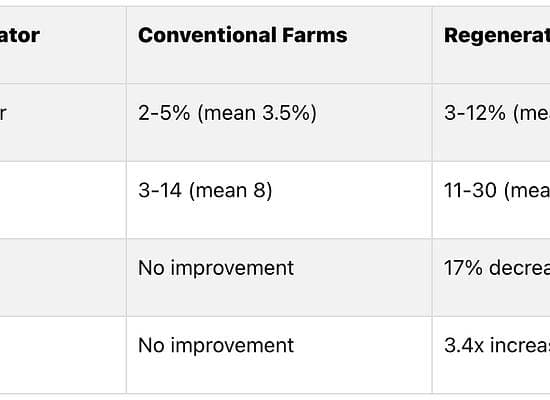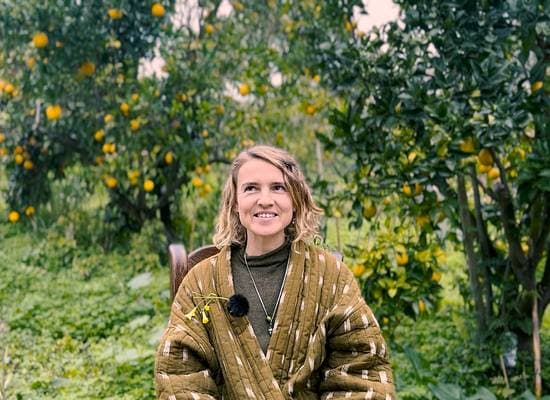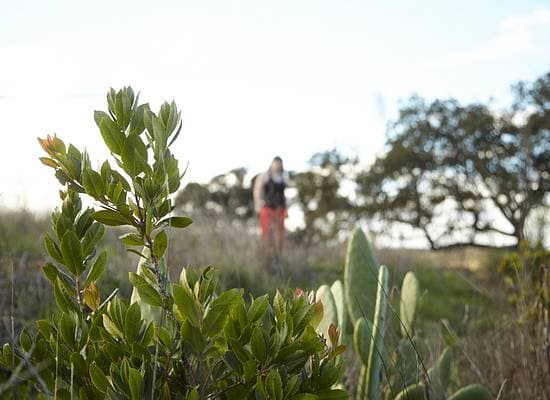Tourism
A regenerative Tourism paradigm

INTRODUCTION
The tourism industry is one of the sectors that has suffered most from the Covid19 pandemic, with a 75% decrease in tourist visits compared to pre-Covid times. So how does this affect an island-destination that derives the majority of its local economy from tourism?
As the growth of tourism and the effects of this monoculture business and its damage to nature have already caused serious concerns pre-pandemic, it's even more important now to raise the question how a future crisis can be prevented. The strong growth of the tourist industry during recent years has come with side effects that have severely impacted the local ecosystem and its inhabitants. If we see Covid as an opportunity for innovation, or even as a catalyst for change, the industry could come out of this pandemic more resilient and maybe even reinvent itself. The approach of regeneration could play a key role in this.
THE SITUATION ON THE ISLAND OF IBIZA
Ibiza has one of the highest seasonality fluctuation ratios in the world and records an average occupancy of around 80% over 180 operating days, whereas mid-July to mid-September this rises to almost 100%. The island has seen a 10% yearly growth of visitors over the last years, mainly driven by international arrivals, which reached over 3 Million in 2019, and with a high level of repeaters. Two thirds of the guests stay in hotels, and the rest are accommodated in rented apartments/private residences, or stay with relatives. The up-market segment had the strongest growth with the number of beds doubling in the 5* category over the last decade.
The long touristic tradition that started in the Sixties has become the dominating sector on the island and is now employing 70% of the population. The primary sector (agriculture), has dropped from over 40% to just a few percent. This is to say that nowadays, 80% of the Balearic GDP comes from tourism, compared to 12% in the rest of Spain (in Ibiza it is even a whopping 90%!). The catastrophic effect the pandemic had on the local tourism in 2020, was only softened thanks to the strong national demand in August, which was actually higher than in 2019. Various rescue measures from the national and EU governments are now being rolled out to support the sector. The priorities for recovery are focused on transformation, increasing resilience and sustainability, versus mass tourism.
At a certain stage in a growth cycle, one needs to redefine priorities, and this may well be that decisive moment for tourism in Ibiza. So, how does the island want to position itself, what are the potentials, and how does it want to move ahead?
INTRODUCING REGENERATION
It has been forty years since the launch of the term 'sustainability', but by now it has become clear that the current sustainability concepts alone will not solve the looming climate crisis. Sustainability seems only to slow down the damages by trying to sustain the status quo and doing less harm, but most of the current sustainability measures don’t question the modus operandi, its worldview, or the underlying structural issues. Here, I am not suggesting that current sustainability measures should be dropped; they just need to be complemented by more regenerative practices. With regeneration, we look at our relationship with life and become stewards of the future, thus transcending the goals of sustainability. Only when we manage to build more resilience in our society, will we be able to cope with future disruption and crisis!
A key difference in regeneration is the underlying thinking, which is based on a holistic worldview. The regenerative perspective embraces a 'whole systems' thinking approach, focusing on healthy ecosystems and their interconnectedness. Regeneration is a paradigm shift in thinking, as it addresses values, beliefs and assumptions on how our world functions, and thus shapes the perspectives we have on life. It views growth, not as expansion in size, but as the development of increasing complexity, productivity and balance.
TRENDS & INFLUENCES
The evolution of tourism has always been a reflection of societal changes. Current trend-research suggests that our society is evolving fast, probably the fastest ever.
● Lifestyles are changing with a growing focus on wellbeing, but an increasing complexity in our life networks, resulting in an ever increasing mobility. Excessive multi-optionality leads to an overwhelming exchangeability of the offers. As a result of this, we are seeing a tendency to slow down, and to simplify life.
● The lines between work and leisure have been blurred, and associated phenomena like digital nomads, home-office, co-working and workations have been emerging.
● There is a growing awareness of the interconnectedness between ecosystems and human activities, leading to a new sense of neo-ecology that includes new values and socio-economic ideas. There is a willingness to pay a premium for ´guilt-free travel´, but this requires creative price-service combinations with clear added value.
● Since consumer-driven sustainability measures are pretty ineffective and not able to cause systemic shifts, there is a growing need for coordinated government policy decisions with real impact.
REGENERATION IN TOURISM
Tourism operates at the intersections of different social domains and connects a variety of industry sectors. It is a key-industry that can pioneer fundamental change when addressing and assuming social responsibility. Nevertheless, tourism has been operating for too long with an attitude of extracting value and externalising the costs of the impact on the global ecosystem. The opportunity to create new approaches and a new understanding of what tourism could be, must not be wasted.
Once we start to look at the net benefit tourism has in a destination, we realize how important the health of the entire ecosystem is. This will also require the implementation of new Key Performance Indicators (KPI´s) that measure success more on the qualitative side, as well as starting to consider the triple bottom line in every decision, which means people, profit and the planet. Nevertheless, the regeneration of an ecosystem can only be achieved if the major stakeholders start aligning around a common vision, sharing trust as well as purpose, as well as actively collaborating.
As travellers seem to be increasingly seeking more profound experiences, the importance of meaningful connections between people and places becomes essential. Creating a sense of place and actually honouring it is an integral part of the regenerative approach, as it fully immerses the traveller in the local history and culture. If we see this as an exchange, where we learn from the place and vice versa, it will reveal its true character and potential.
REGENERATION IN HOSPITALITY
The most important aspect is to start understanding and embodying this new paradigm of regeneration. This will then guide the decisions on all levels from operations to positioning. The authenticity with which you go about it is the key, and this has to involve all staff, because when your team becomes more engaged, it can bring its strengths and passions to the table, increasing resilience and satisfaction. This will be essential as the human factor is the decisive element in the creation and delivery of compelling experiences.
To integrate regenerative principles in a hotel, one has to create the circumstances for regeneration to be experienced by the visitors. By crafting spaces for engagement, interaction and insight, the guests are invited to learn and be inspired. We could say that we engage travellers in a collaborative discovery of life, which might be the first step to trigger a transformative, or memorable experience.
If we see hospitality as offering quality of life with inspiring human encounters, it is all about how the guest experiences are designed. With a growing individualisation, it's hard to design offerings that appeal to everybody. Therefore, the participation of the visitor and the act of co-creation of their experience gains importance. This is a new approach but it is applicable to almost any guest segment and setting. So regeneration does not only apply to the luxury segment, it also works with the mass market, which for instance is expected to be affected most by the pandemic.
Hence successful providers will try to embrace this evolution and start to engage in new and lateral cooperation, creating spaces of resonance that allow the unfolding of experiences that were not possible before. Creative and emotional storytelling will support the emergence of 'regeneration-smart' destinations, where hybrid and neo-eco concepts are inspired by glocalisation (the merge of global and local perspectives). A hotel is part of the local community, with its influence going way beyond the property line and even the existence of the business.
So as a starting point, let's begin by assessing the opportunities where you can add value. As a guideline, we can use the different capitals (financial, natural, produced, human, social, intellectual, cultural and political). All these areas offer themselves to develop regenerative perspectives and initiatives. It can also be helpful to look at the Sustainable Development Goals (Tourism for SDGs) as inspiration, then pick a domain or two to work with.
OPPORTUNITIES
Right now a lot of people and organisations in the industry are thinking about how to adapt to the new normal. Being proactive and having a vision for the future is better than simply reacting. If we have clarity on an ideal scenario, we can start to include its goals in regenerative ways, to our mid and long-term strategies. To imagine a new scenario requires the creation of a new narrative. What story should the future of tourism on this island tell? What steps are necessary to reinvent tourism and how will we feel if it is successful?
So how to translate our vision into concrete measures is the key question. How will this relate to investments, operations, standards, marketing and communication?
● The main answer is that a shift from 'best' to 'better' practices is needed, which means that there are no tried and tested recipes, checklists and easy answers. Better practices are emergent, flexible and to a certain extent also more complex and intuitive. In a world of exponential complexity, the old approaches to problem solving unfortunately don’t work anymore. We are stepping on unchartered territory which can be at first a bit scary, but if we do it step by step, it will be exciting and rewarding. We will not change tourism in a year, but now is the moment to make the right decisions that will influence the years to come.
● There needs to be collaboration, which will have to happen at a destination level, where private and public stakeholders work on common initiatives and create alliances, as well as an increase in co-creation amongst different players and operators by pooling structures, resources and data. This will be a first step to craft a solid foundation for a regeneration paradigm to emerge on the island. These collaborations will need to include all the different stakeholder groups, plus representatives of the established industry that made tourism on the island what it is, with the addition of young players that come on the market with new ideas and concepts. Several local organisations are already advocating different approaches and have prepared frameworks to spread sustainability measures. With the necessary funding, their efforts over the last years can now be leveraged, scaled and integrated into official programs.
● To increase the overall economic resilience, a certain diversification will be necessary. This can be achieved with a green and circular economy approach, especially by reviving the primary sector and its food production system. In order to lengthen the seasonality, one can also tap into the potential of the 'new work' development, exploring programs to attract start-up and technology innovation, as well as co-living initiatives. An opportunity could also be the repurposing of touristic infrastructures in order to convert them to hybrid-use concepts that combine living, working, leisure and other activities.
● Also, there needs to be a focus on prototypes and showcase projects that act as models to represent the visions and ideas, making them experienceable. This can be a combination of existing initiatives, but should also include new projects that are designed to experiment with structural change and act as inspiration not only for tourists, but also for the local population and industry. Long-stay and multi-use development concepts that focus on wellbeing, health or retirement would also contribute to more economic stability and quality tourism.
New ways of collaboration that create social cohesion and inclusivity, drawing inspiration from methodologies like social innovation labs and participative processes will foster a truly regenerative process. This process needs to be co-created by all stakeholders, being inspired by a vision that will transform the island for the better. Regeneration begins with the way we engage, interact, relate and work with each other. So coming together as one island will be crucial for the success of its renaissance!
More on the author on his website: www.atma.life

My purpose is to create spaces that enable and inspire transformation, allowing society to transition to a new paradigm. I am a catalyst in that transition, connecting the old to the new by building bridges to the emerging unknown. My passion is to support projects in tourism and hospitality that want to embrace the opportunities of change.
What to read next

Regenerative Agriculture vs Conventional Farming: Key Differences
Across Europe, from the arid landscapes of Portugal's Alentejo to the rich soils of Central Europe, farmers are facing unprecedented challenges. As climate chan...

Evgenia Emets: Art, Regeneration, and the Rise of Forest Sanctuaries
Head over to our Learning Hub to become a Wanderer and unlock access to the full video class, along with many others.Evgenia Emets doesn’t just discuss regenera...

Natural Assets - The New Economy of Nature
Head over to our Learning Hub to become a Wanderer and unlock access to the full video class, along with many others.The New Economy of Nature: How We’re Revalu...
